This website is devoted to the miliary career of Major Paul Hildreth, but that experience did not define his career and personal accomplishments. Paul was an entrepreneur and prominent civic and business leader.
Paul was born in 1921 to Arvie Novesta ‘Vesta’ and Mattie Lee (Byrd) Hildreth and attended Farmers Academy in New Brocton, Alabama from 1927 to 1933. The family moved 30 miles to Brundidge where Paul attended and graduated from Pike County High School in 1939 after successfully completing his junior and senior year courses in one academic year. There he met his sweetheart, Annie Lester Crawley. Their senior class yearbook pictures and captions convey lasting characteristics.


The year after high school, Paul completed a nine-month course of study for a diploma in accounting at Draughon’s Business School in Montgomery, Alabama. His early work included serving as a partner/manager in the Marshall and Hildreth general merchandise store and as a bookkeeper for Ramage Auto Company (Chevrolet Dealer), both in Brundidge. From September 1941 to October 1942, Paul was an accountant and Assistant Group Supervisor in accounting at the E.I. DuPont De Nemours & Co. munitions powder plant in Childersburg, near Sylacauga, Alabama.
Paul and his high school sweetheart, Annie Lester Crawley, eloped and married on February 7, 1942 in Wetumpka (Elmore County). They made their first home in Sylacauga.
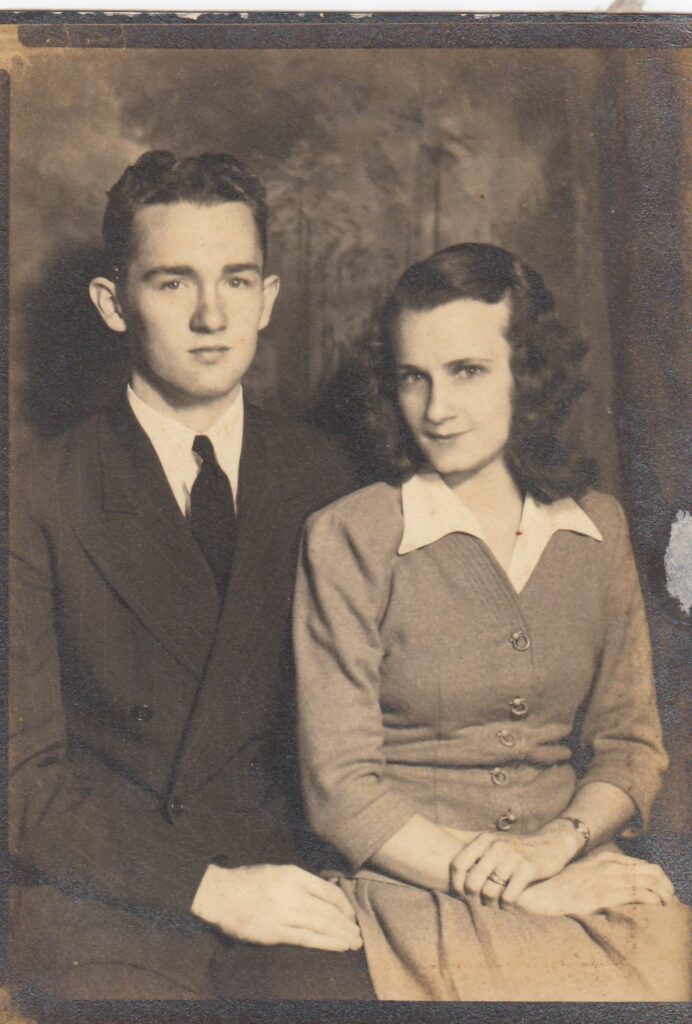
In May of 1942, Paul was notified by the local draft board that he would soon be called for service. Paul responded by enlisting in the Air Force Reserve on May 22, 1942 as an Aviation Cadet, but was not placed on active duty until October 28, 1942 in Nashville, TN. In 1943, as an Aviation Cadet, Paul attended preflight, primary, basic, and advanced flight training. Upon graduation from advanced training on August 30, 1943 and receiving his Pilot Wings, Paul was Honorably Discharged from Aviation Cadet status and appointed and commissioned as temporary Second Lieutenant of the U.S. Army. He received an Honorable Discharge from active military service on November 30, 1945. However, he was still appointed in the Air Force Reserve into the 1950s.
This website explores Paul’s miliary career. With a first name ‘Major’ (which was the first name of his maternal grandfather) it was inevitable that he and his friends took advantage of Paul being called ‘Lieutenant Major’ or just ‘Major’ to claim certain advantages in informal settings.
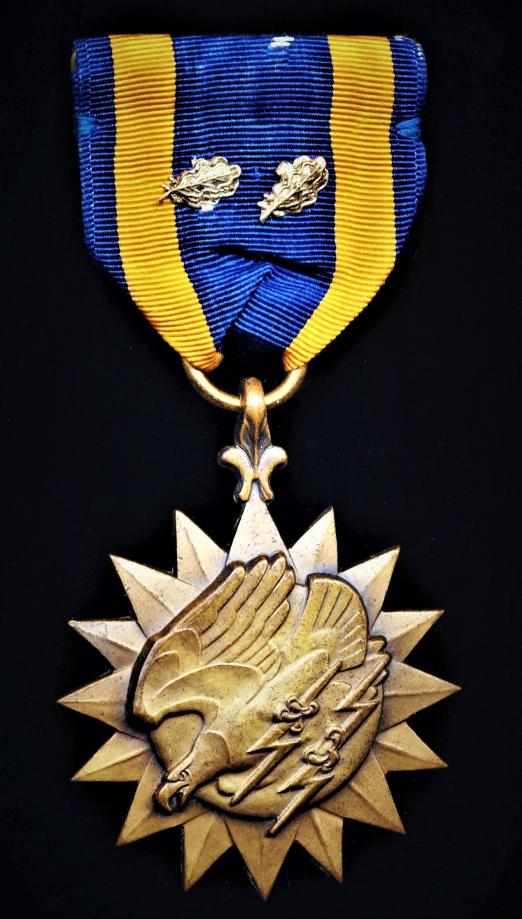
In his military career, Major Paul Hildreth was a Pilot in the following battles and campaigns: Rome-Arno; Air Combat Balkans; Air Offensive Europe; and, Normandy. He was awarded the European African Middle Eastern Theatre Ribbon with 4 Battle Stars and the Air Medal with two Oak Leaf Clusters.
After the war, for one year, Paul served as County Service Commissioner for the Department of Veterans Affairs in Troy (Pike County). In 1949, he served as Commander of American Legion Post 145 in Brundidge and, for the state-wide American Legion, he served as the Southern Area Vice Commander.
Paul joined his father in a business partnership and, later, became the longstanding owner and operator of Brundidge (Hildreth) Seed & Feed Company on Main Street. In 1950, Paul entered into a peanut, seed and fertilizer business in Banks, Alabama, named Farmers Trading Company, with two brothers-in-law, but the venture only lasted for a few years. More significantly, during the 1950s, Paul built a chain of Hildreth Feed, Seed and Fertilizer Stores in five additional cities in the Wiregrass region of Alabama (i.e., Abbeville, Andalusia, Geneva, Opp, and Ozark). The chain store concept eventually failed due to the difficulty of finding store managers who could handle all the burdens of managing a store. In 1959, he opened Hildreth Peanut Company with a peanut elevator and transfer tanks on the south edge of Brundidge that lasted for a few years. For over three decades, the Brundidge store on Main Street was a gathering place for farmers and city residents buying feed, seeds, and fertilizer, or selling pecans. Often they just socialized around the potbelly stove or sitting on feed sacks. The ever-present Needham Stewart helped operate the store.

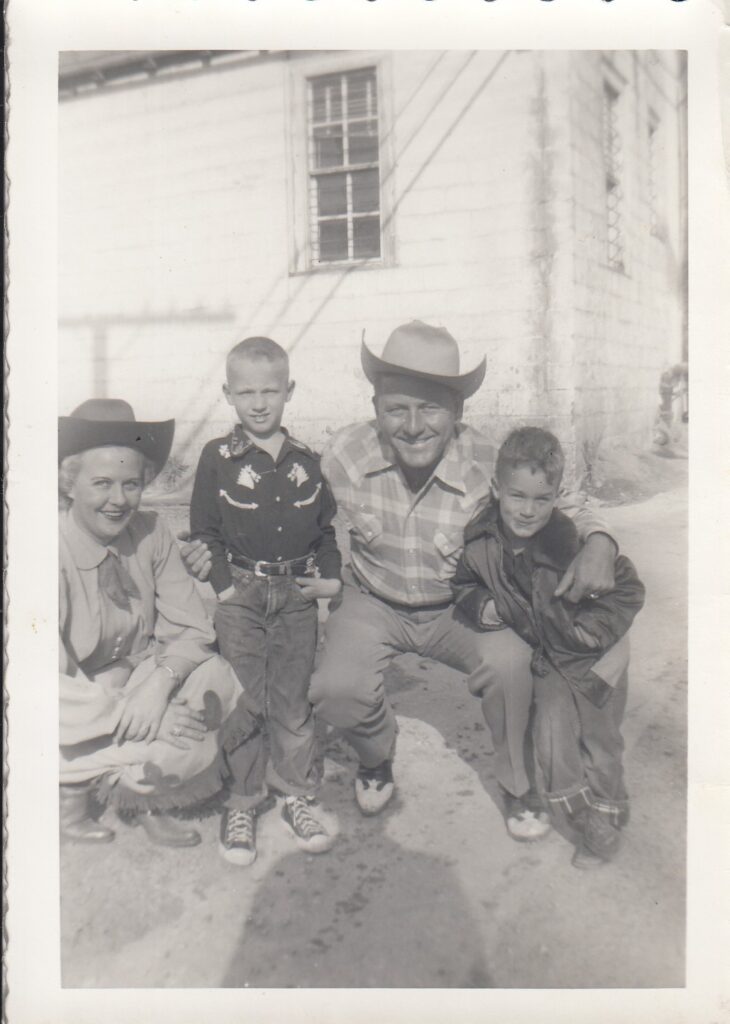
The Hildreth family has a long history in the pecan business. Paul’s grandfather, George T. Hildreth, had a store with his sons in an area that was referred to as Pecan Park.
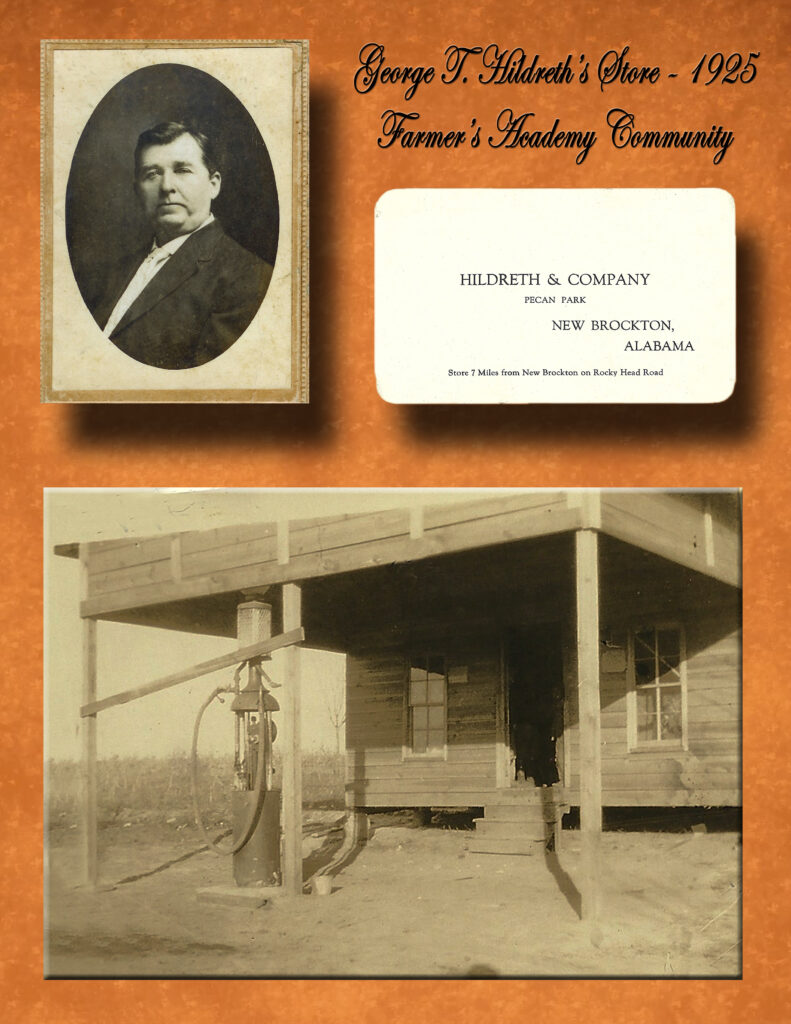
Paul’s father, Arvie Novesta ‘Vesta’ Hildreth moved his family to Brundidge in 1933. Initially, Vesta created a partnership called Hildreth and Ramage to buy pecans. After the death of Mr. J.T. Ramage in 1938, Vesta became sole owner and built the operation into one of the largest pecan wholesalers.

Paul built on this family legacy by creating several innovative methods as Hildreth Pecan Company – ‘Dealers, Shellers, Packers’. He marketed vacuum packed select pecan halves (under the ‘Say Rodger” brand) in Southern grocery stores and mailed boxes of select pecan halves to families and businesses across the country, especially during the holiday season. Other area pecan wholesalers confronted a secretive innovation when Paul built a shaking machine that separated meatless pecans (really just shells) from the ‘heavy’ (with meat) pecans than could demand a high resell price. Paul then devised a method to make the otherwise useless meatless pecan shells into a salable item by dipping them in red dye and packaging them in small mesh bags (two red dyed pecans are shown below in a container similar to the ones used for pecan halves). Once he had a trailer truck load, he drove it to Chicago and sold the packages to area grocery stores during the holiday season. To many, this was a slam at unsuspecting Northerners.

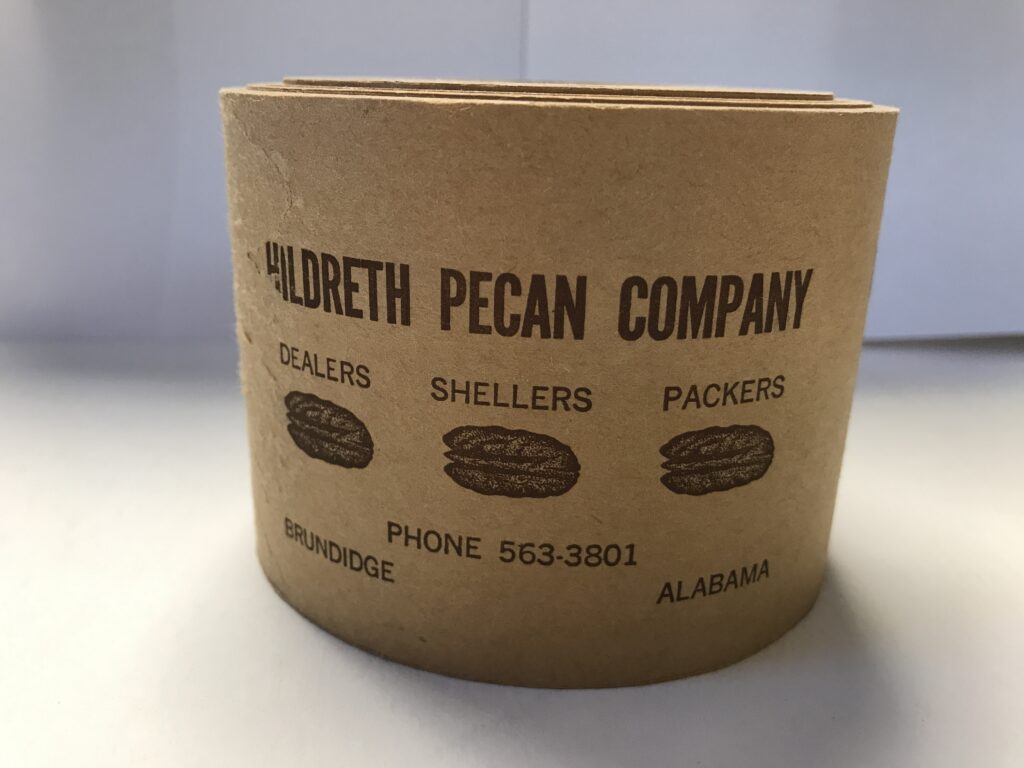

Paul was an officer and director of Brundidge Banking Company for over 20 years, beginning in the mid-1950s.
Building on the years of supplying small family farms, including their flocks of laying hens, Paul envisioned a different future for local farmers. Around 1959, the Hildreth Egg Co. worked with Quaker Oats Co. and a local bank to establish around Brundidge what evolved into one of the first successful contract poultry operations in America. Paul operated a bulk storage and delivery system of chicken feed and a delivery service of bags of oyster shells and grit to the contract growers located in several counties in the Wiregrass area. The contract program started with an initial 26 sites totaling over 280,000 layers. Later, he built an Agrico Farm Service Center to provide bulk storage, blending, and delivery system for farm fertilizers. In the 1970s, Paul unwound all the business activities related to his Brundidge store.
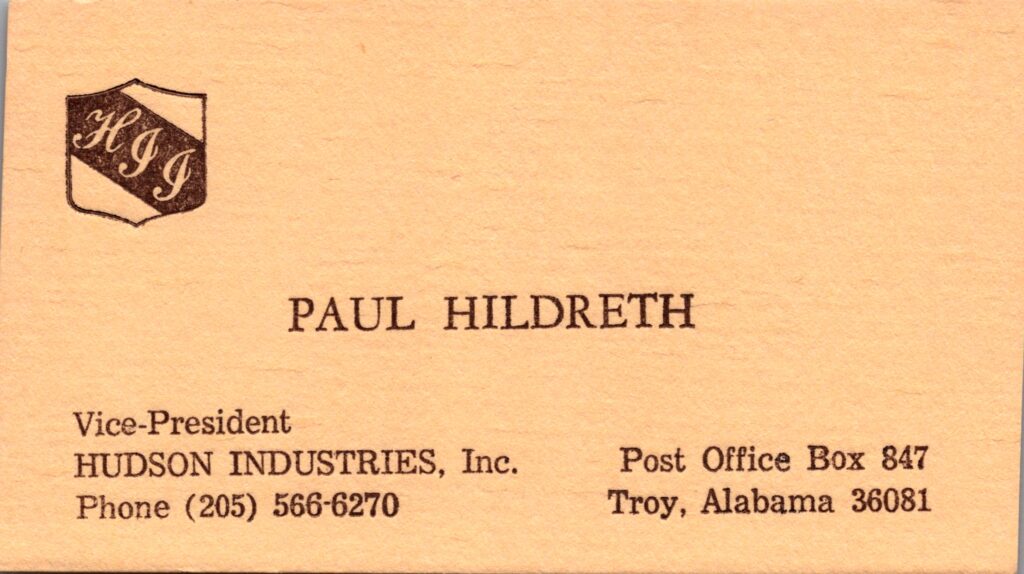
From the late 1970s until his retirement shortly before his death, Paul worked for a food manufacturing company. Paul started as Comptroller when it was named Brundidge Foods, Inc., and, after it moved to Troy and was renamed Hudson Industries, Inc., Paul became Vice President, Finance and Chief Financial Officer. Later, he transitioned to President of Hudson Transportation, a wholly owned subsidiary, and a member of the Board of Directors of Hudson Industries. During his years with Hudson, annual revenue grew over ten times from about $3 million to over $33 million.
Paul was a member of the Brundidge Rotary Club (including service as President) and the Troy Rotary Club and was active in the Brundidge Chamber of Commerce (including service as President) and the Pike County Chamber of Commerce. Soon after his death in 1985, the Pike County Chamber of Commerce created and named its educational foundation in his honor.

Annie Lester was a spirited young lady who grew up outside Banks, Alabama on the large acreage that was referred to locally as the Crawley Quarter that her father accumulated out of the fruits of his road building activities throughout Southeast Alabama and through productive farming operations that led to national prominence. Her parents were William Bartley Crawley and Willie T (Brantley) Crawley. Annie and Audrey Mae Sheppard (who later married Hank Williams) were known to enjoy a good time together. Annie attended what is now Troy University for one term as a sorority pledge but showed little academic interest. She and Paul soon eloped and she accompanied him to several military posts. Over the years, Annie Lester assisted her husband in the Brundidge store, especially during pecan season, but she spent most of her time raising their two sons. She was a member of the local Three Arts Club. The family were members of the Brundidge Methodist Church.
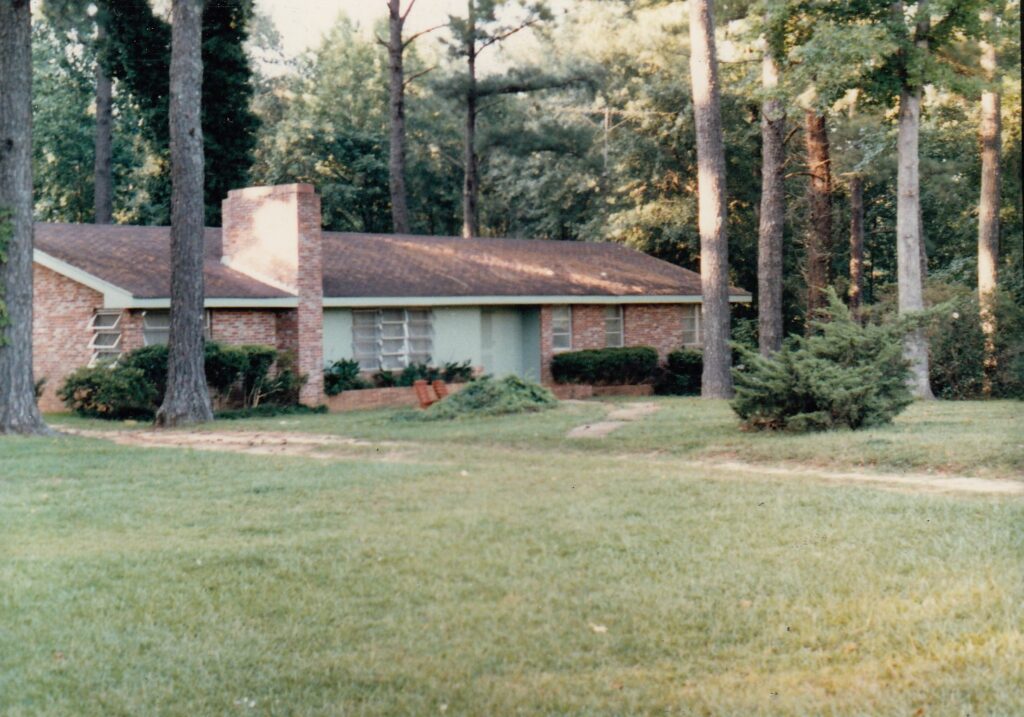
In 1957, Paul and Annie Lester moved their family from Oak Street in Brundidge to their new brick home and farm located on the 1.5 mile Crawley family road in Banks (officially the ‘William Bartley Crawley Road‘ or State Highway 201). A year earlier, she had obtained the 40-acre site from her late father’s other heirs, with 219 acres added once the estate was settled. The new home was an innovative all-electric house that Paul designed with double brick walls (with an air space in-between for insulation) out of materials recovered from surplus buildings purchased from the Army Corps of Engineers at Fort Rucker, near Ozark. Of the four surplus buildings he bought for $839 in 1956, he moved two of them intact from Fort Rucker with one becoming a tenant house on the farm and the other sold to make a nice home in Brundidge. (This connection to Fort Rucker is all the more interesting given that Paul was born on his family’s farm on property that was later taken by the U.S. government to expand that base.) The house and farm had access to abundant spring water. At the Banks house, he built (not contract for) a concrete swimming pool in 1963 which became a gathering place for family and friends. The farm was the site of six (initially three) large chicken houses that housed over 25,000 laying hens. Later, the chicken houses were converted for use in a chicken fryer/broiler program.
Annie Lester Crawley Hildreth died March 12, 1985 in Troy. Major Paul Hildreth died July 13, 1985 in a Montgomery hospital. They are buried together at the Baptist Church Cemetery in Banks in her family’s plot.
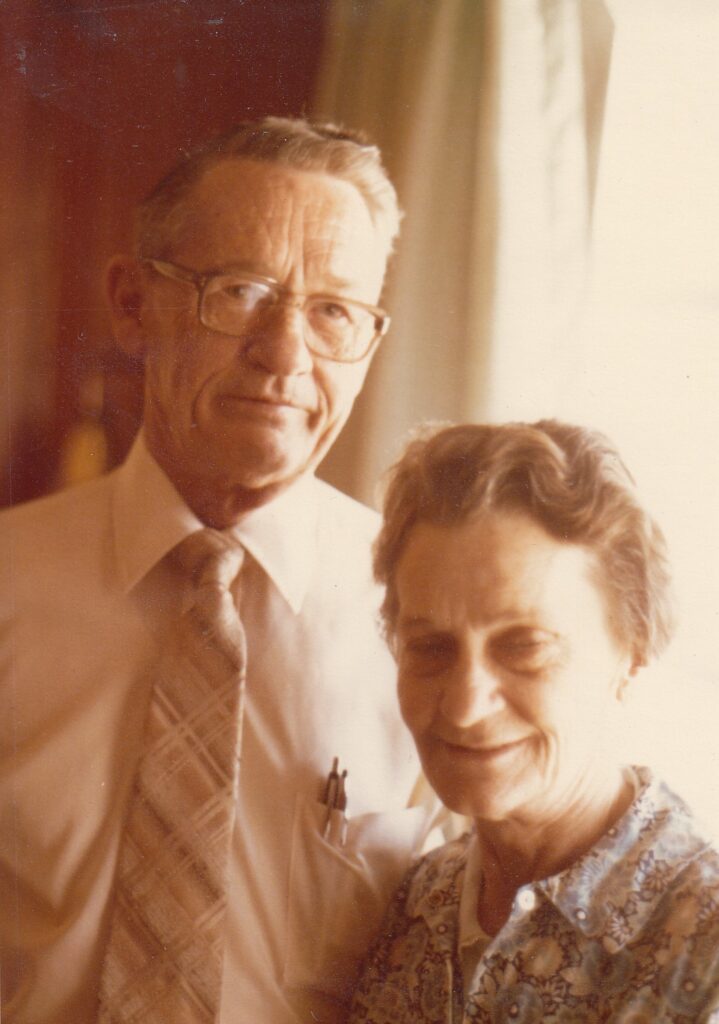
Major Paul and Annie Lester had two sons. Although neither parent had a college education, both sons eventually earned Ph.D. degrees in their respective disciplines. Like their father, each are military veterans and both served as a Chief Financial Officer (but of city governments) during their career.